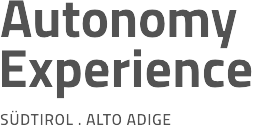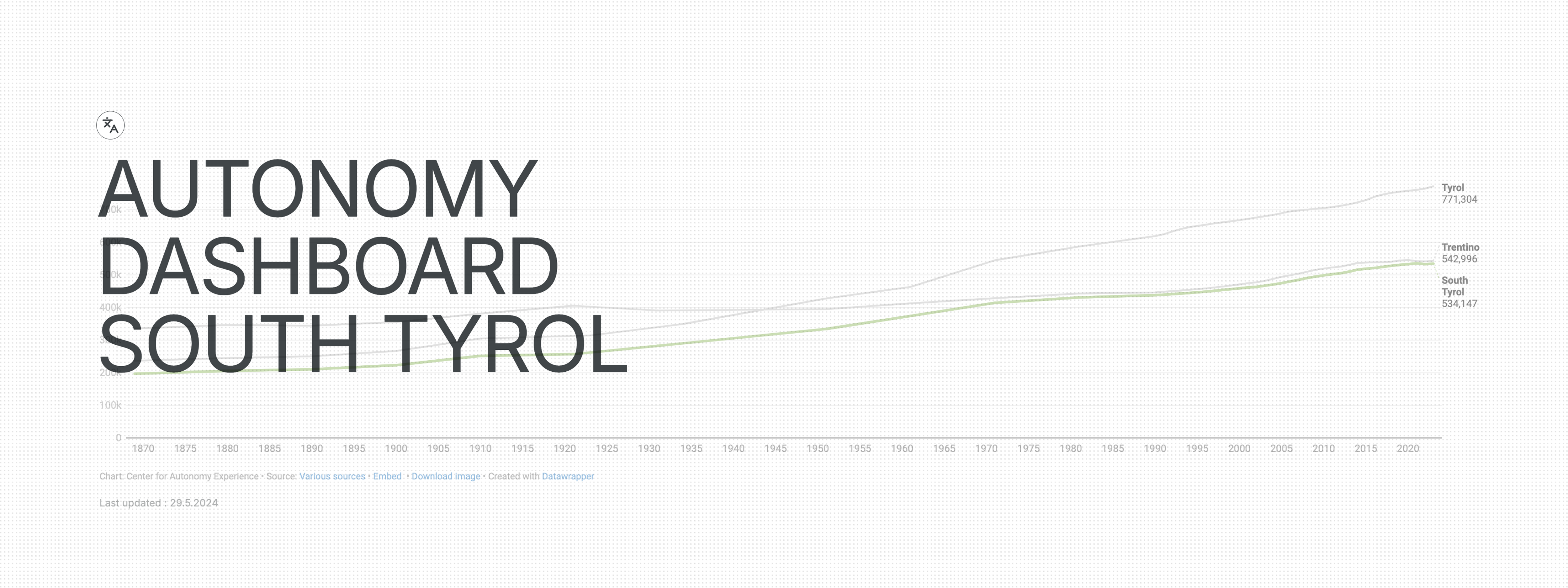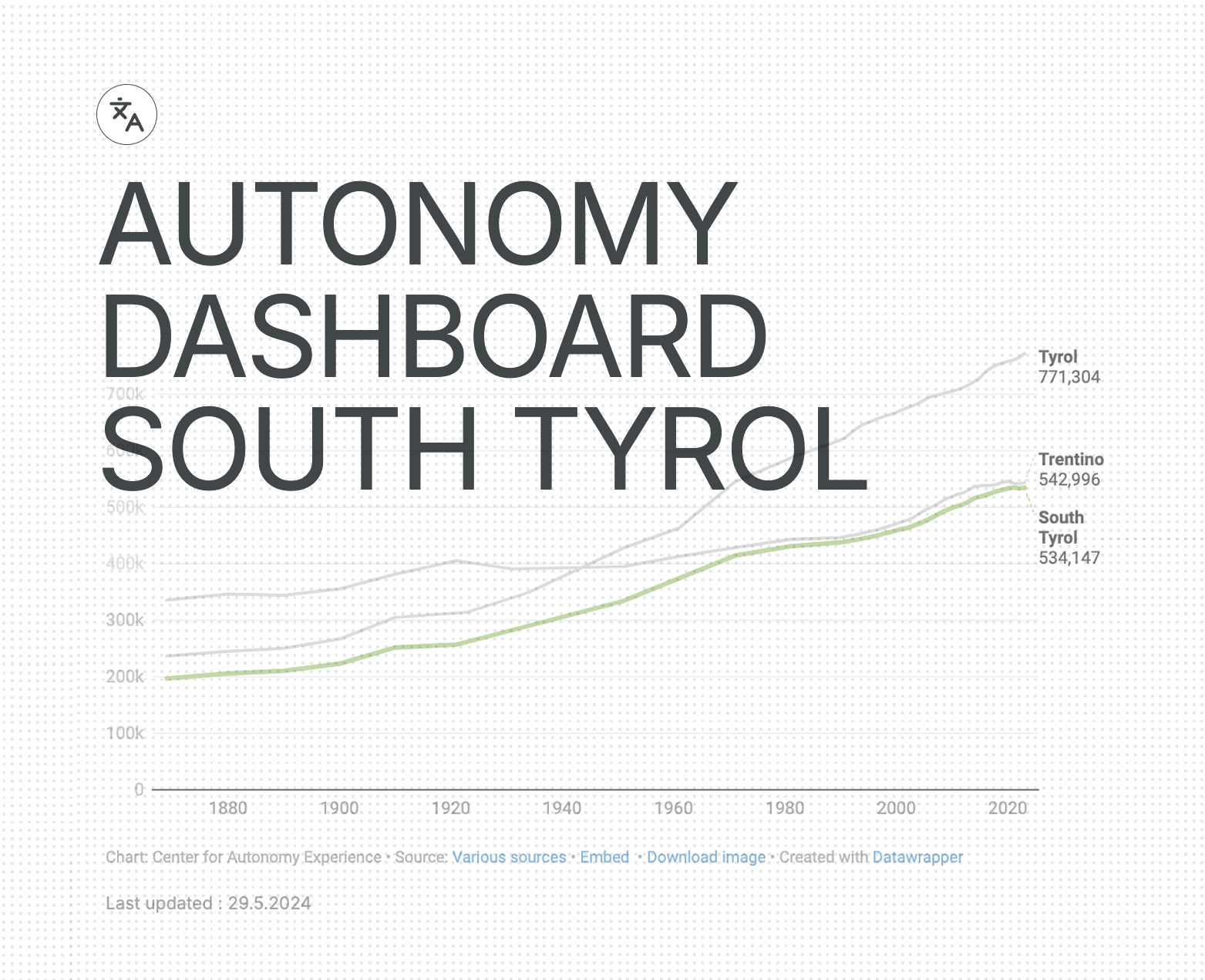Photo by Samuel Clara on Unsplash
Facts about autonomy
This 10-minute video describes South Tyrol’s long journey from a threatened minority region to an autonomous province characterised by strong self-government and seen as a worldwide model for minority protection. The video pays particular attention to explaining the individual mechanisms that make it possible for the three language groups to live peacefully together. It is available in six languages (German, Italian, English, Arabic, Mandarin and Russian) with subtitles on our YouTube channel “Autonomy Experience”.
South Tyrol, the northernmost province in Italy, is characterised by a territorial autonomy and a peaceful cohabitation of German, Italian and Ladin language groups. Due to the existence of linguistic minorities, the Autonomous Province of Bolzano/Bozen – as a part of the Autonomous Region Trentino-Alto Adige/Südtirol- is part of one of the five Autonomous regions with special statute in Italy. Over time, the Autonomous Region received a significant number of competences, which devolved to the two Autonomous Provinces of Bolzano/Bozen and Trentino.
Today, the South Tyrolean autonomy model is considered one of the most successful power-sharing arrangements in the world, thanks to its far-reaching autonomous powers and its implementation mechanism.
At the beginning of the twentieth century, South Tyrol was part of the Austro-Hungarian Empire until later being annexed by Italy following the 1919 Treaty of Saint-Germain-en-Laye. Following the Fascists rise to power in 1922, South Tyrol underwent an intensive ‘Italianisation’ process. This included the prohibition of German language schools, and the 1939 ‘Option Agreement’ between Mussolini and Hitler, which gave German speakers the choice of either relocating to the Greater German Reich or staying in South Tyrol with the constraint of being Italianised. After WW II, the ‘Gruber–De Gasperi Agreement’ (1946) between Italy and Austria guaranteed autonomous legislative and executive powers and regulations to safeguard the German minority.
After an unsatisfying First Autonomy Statute in 1948, the political negotiations were accompanied by bomb attacks from the mid-1950s to the end of the 1960s. In 1972, the Second Autonomy Statute was enacted. The Second Autonomy Statute transferred most of the legislative and administrative powers from the Autonomous Region Trentino-Alto Adige/South Tyrol to the Autonomous Province of Bolzano/Bozen. The Statute is still in place today and is considered the basis for South Tyrol’s autonomy.
Legally speaking, the Autonomy Statute of 1972 has constitutional rank and therefore ordinary law can neither interfere with, nor change the provisions within the Statute. The Statute has been implemented mainly by so-called ‘enactment decrees’ elaborated by special commissions and bilateral negotiations with the State. Special procedures, cooperation mechanisms and financial autonomy guarantee the wide range of autonomous and administrative powers of South Tyrol.
South Tyrol’s autonomy arrangement is designed to regulate the balance of power between South Tyrol’s language groups with language equality measures, reserved positions, executive proportionality, public service employment proportionality and public funding proportionality.
To guarantee this proportionality system, a ‘declaration or affiliation to a language group’ is needed to determine the number of people in the province who primarily speak each official language. Furthermore, a ‘personal declaration’ is supposed to be made by anyone who applies for a position subject to language group reservation or proportionality rules, such as public or political posts. People who do not want to be affiliated to any of the three official language groups can declare themselves as ‘other’ but to exercise their personal rights, they still must choose to be ‘affiliated’ to one of the three official language groups. Therefore the affiliation ‘other’ mainly has symbolic power.
South Tyrol’s linguistic equality is evident as Italian and German speaking citizens have the right to use their own language within public administration as well as in court. Similarly, Ladin citizens have the right to use the Ladin language in Ladin valleys.
South Tyrol also has a variety of media (TV, Radio, newspapers) in both the German and Italian language. The European Association of Newspapers in Minority and Regional Languages (Midas), an association representing minority newspapers, has its headquarters in South Tyrol.
South Tyrol’s school system is divided and based on monolingual instruction in German or Italian. The Ladin school model however, focuses on an almost equal education in the three languages (Ladin, German, Italian). Each school department is under the political control of each language group. However, parents can freely choose the school type for their children.
The main political institutions in South Tyrol are the provincial council, the provincial government and the provincial president.
The provincial council, consisting of 35 members, each elected for 5 years, constitutes the legislative body of South Tyrol. The provincial government is the executive body and implements the laws passed by the council. Its composition must reflect the number of the language groups represented in the council. The president represents the province.
Today, South Tyrol is considered as a successful example for conflict-regulation and is studied by local and international researchers. Several factors have contributed to this, but the most important is its power-sharing, which transformed past conflicts into peaceful cohabitation by desecuritising/normalising the relationship between its language groups.
Being aware of the strengths and weaknesses of the South Tyrolean model has led to a culmination of experience and knowledge regarding minority protection and autonomy, which today can be shared with other realities.
In case you need further information, further readings or would like to learn more on our training activities, feel free to contact us.
Autonomy Dashboard South Tyrol
The Autonomy Dashboard South Tyrol provides an overview of important statistics on South Tyrol’s autonomy and minority protection. It brings together data from various statistics institutes, research organisations and public institutions on one platform. The dashboard allows you to identify trends or make comparisons so you can draw your own conclusions.
Policy Brief



This policy brief provides an overview of the recent reform of the Autonomy Statute and analyses the draft constitutional law.
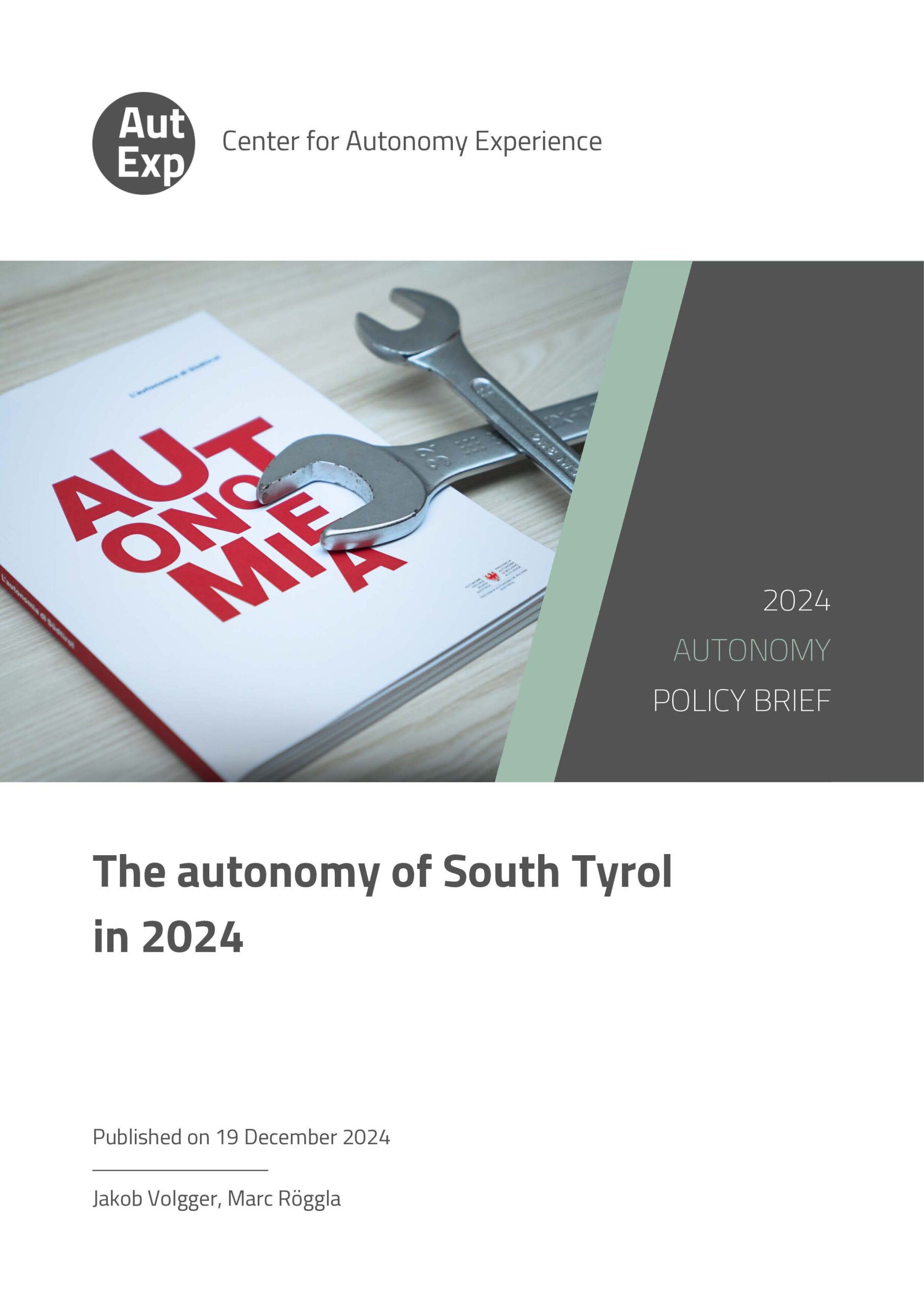
The Autonomy Policy Brief 2024 analyses the latest autonomy developments in South Tyrol. The topics covered include the formation of the new Provincial Government, the autonomy reform, new enactment decrees, the language group census, developments in the area of bilingualism and trilingualism, school policy debates and new financial regulations.

The Autonomy Policy Brief 2023 analyses the recent political developments in South Tyrol. The areas of focus covered include the election of the Provincial Council, new enactment decrees, finances, the language group census as well as current school policy debates.
Podcasts


AutIN – Autonomy and Integration is a podcast by the Center for Autonomy Experience and the Center for Migration and Diversity at Eurac Research. We focus on a topic that is both timely and complex: autonomy and integration in South Tyrol. At first glance, these two concepts may not seem connected, but they are deeply intertwined—especially in our province. Autonomy has long been a tool for protecting the region’s minorities, but it can also provide valuable insights into how people coming from around the world can be integrated. This podcast seeks to answer a central question: How can we transform a successful model of coexistence into an equally effective resource for integration?
Through in-depth discussions, key insights, data, personal stories, and analyses, we aim to gain a better understanding of this reality. We hear from experts, representatives of civil society, institutions, associations, and migrants to develop a clearer and more comprehensive perspective.
The podcast is hosted by Giorgia Zogu from the Center for Migration and Diversity and Erjon Zeqo from the Center for Autonomy Experience, both of Eurac Research. The interviews are in German or Italian.
Autonomy and the protection of minorities are omnipresent in the everyday life of South Tyroleans. However, people living in South Tyrol often do not consciously perceive the significance that South Tyrol’s autonomy and the protection of minorities hold for each individual and for society as a whole. “Understanding Autonomy”, a multilingual podcast series available on Spotify, Apple Podcasts and all other popular podcast platforms, pursues precisely this goal: to learn to understand autonomy. Experts who deal with the topic of autonomy in different fields provide insights into specific issues of South Tyrolean autonomy.
The Autonomous Province of Bozen/Bolzano and the Center for Autonomy Experience of Eurac Research have planned a total of ten episodes on various topics. “The first episode is about the basic question of what autonomy actually is,” explains the head of the Center for Autonomy Experience, Marc Röggla. “In the further course, the historical background or the legal basis of South Tyrol autonomy will be examined. The role of autonomy for South Tyrol’s youth and language groups will also be in focus.”
The podcaster of “Understanding Autonomy” is the journalist Anita Rossi. Nadia Rungger takes on this role in the Ladin episode. The podcast was produced in the studio of Radio Grüne Welle.
For the Ladin episode “Autonomia y la rujeneda ladina” the transcriptions are also available, in German, Italian und Ladin.
Autonomy Experience, together with the Vereinigte Bühnen Bozen and the Institute for Contemporary History of the University of Innsbruck, has created the podcast “Option. Stimmen der Erinnerung. Le Opzioni in Alto Adige Südtirol.”
Option means having a choice. Having options in life is usually perceived positively. For South Tyrol, however “the Option” is one of the darkest chapters in history. The population was faced with an almost impossible decision: to “stay” and thus to choose their place of residence and home – however, with the prospect of giving up the German-speaking identity or “opting” for the German Empire in order to preserve the mother tongue and traditions, but losing South Tyrol as home.
In the podcast, South Tyrolean contemporary witnesses give insights into their emotional world and tell first-hand about their memories. “The Option” is also illustrated by selected experts in the podcast.
The podcast is in German and Italian.
Politika
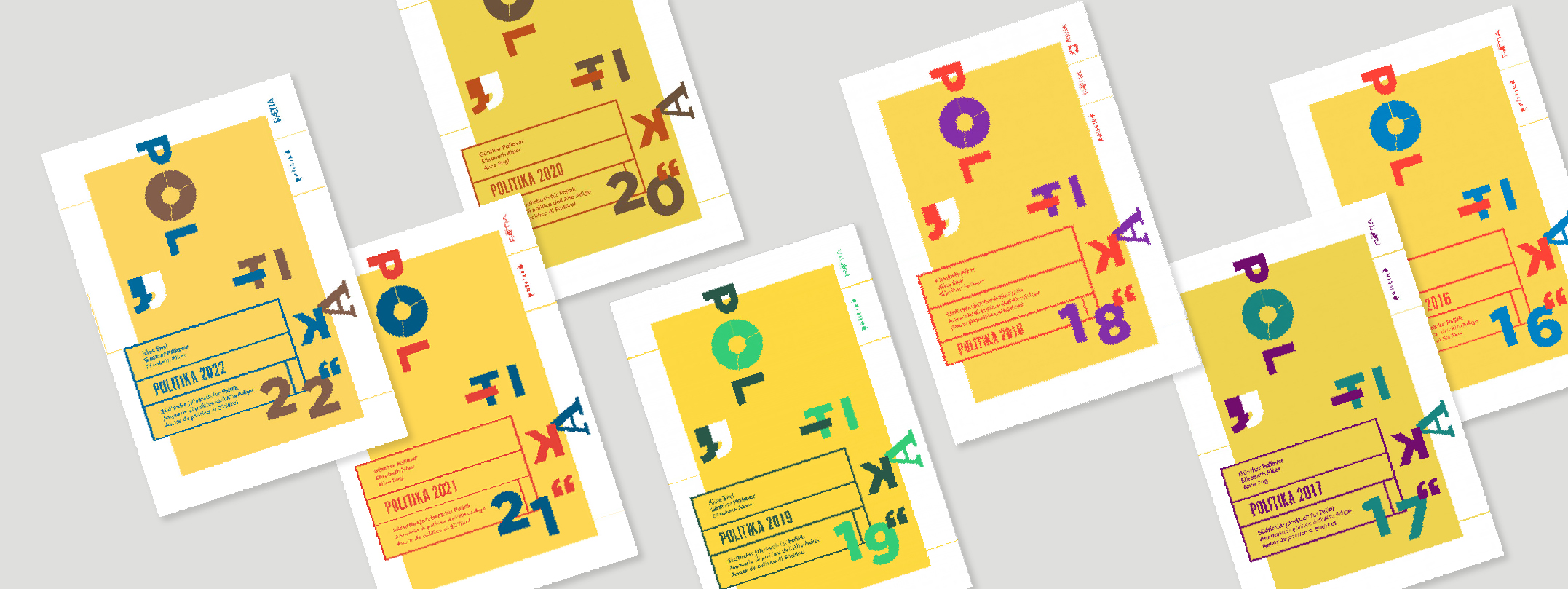
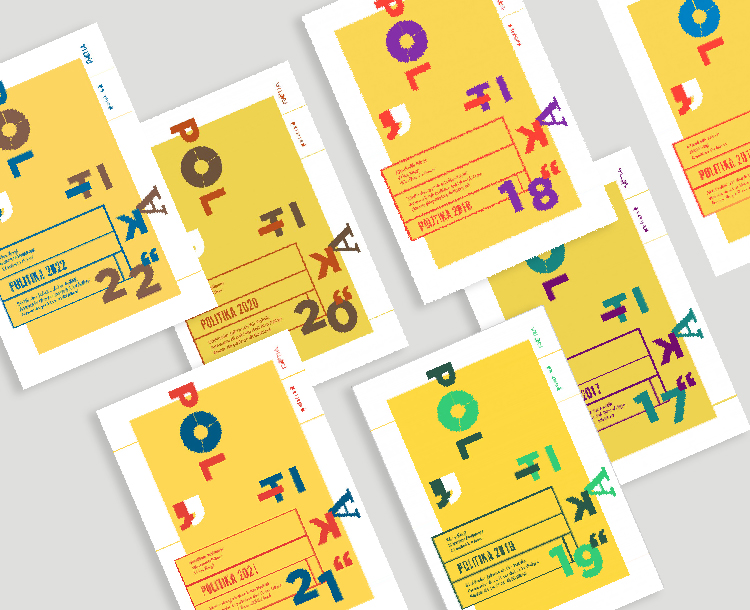
Politika is the yearbook of the South Tyrolean Political Science Association. The purpose of this publication is to promote political science research in South Tyrol and to bring research results on the political reality of South Tyrol to the attention of the public. The core of each issue is the annual theme, which is analyzed by different authors from different perspectives. South Tyrol’s neighboring regions Tyrol and Trentino are also taken into account. This is Politika’s open access catalog and all interested parties can access Politika’s articles.
